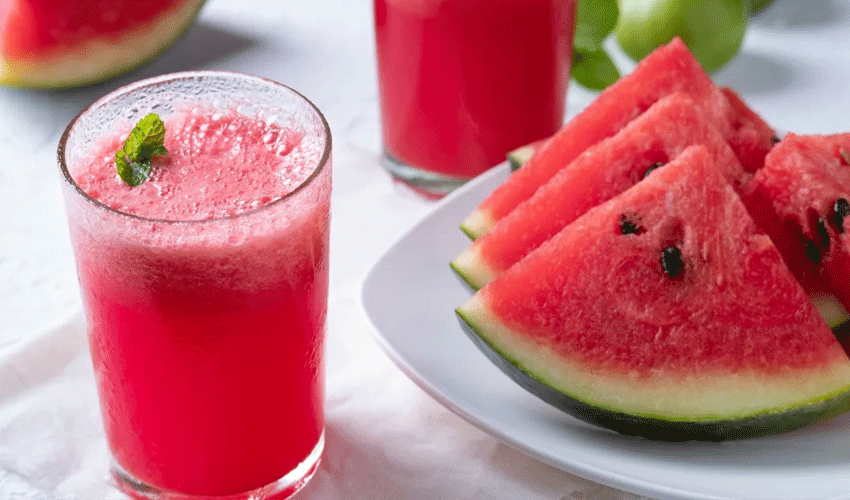Watermelon stands out as one of the most refreshing and hydrating fruits, particularly during the summer months. Yet, you might have encountered the advice, “Don’t drink water after eating watermelon!” or “Avoid milk after watermelon – it can cause indigestion!”
These warnings have been passed down through generations, notably within South Asian and Middle Eastern households. But is there any scientific basis to these claims?
In this blog post, we will delve into:
- The science behind consuming watermelon with water or milk
- Traditional beliefs and Ayurvedic perspectives
- Insights from modern nutrition
- Final recommendations based on health understanding
What Makes Watermelon So Special?
Watermelon boasts a composition of over 90% water and is packed with vitamin C, vitamin A, electrolytes, and antioxidants like lycopene. It is well-regarded for its ability to:
- Cool the body
- Support hydration
- Enhance digestion
- Detoxify the system
However, its high water content and slight acidity also classify it as a “cold” food in traditional medicine, which contributes to the origin of these cautionary tales.
Is Drinking Water After Eating Watermelon Harmful?
Traditional Belief:
It is traditionally believed that consuming water immediately after watermelon can lead to digestive issues such as:
- Bloating
- Acidity
- Upset stomach
The Rationale: Watermelon already has a significant water content. Drinking more water might dilute stomach acids, potentially slowing down digestion and causing fermentation in the gut.
What Does Science Say?
There is no robust scientific evidence indicating that drinking water after eating watermelon causes any serious harm. However, consuming cold water after watermelon may temporarily upset sensitive stomachs by slowing down the digestive process.
Possible Issues (Rare, but Plausible for Some):
- Mild bloating due to delayed gastric emptying
- Slight discomfort in individuals with IBS or weak digestion
Safe Tip: Allow a 15-30 minute interval between eating watermelon and drinking water, especially if the water is cold. Warm or room-temperature water is less likely to cause any issues.
What About Drinking Milk After Watermelon?
This combination is even more of a contentious topic.
Ayurvedic Perspective:
According to Ayurveda, watermelon (a sour, cold fruit) and milk (a heavy, sweet liquid) represent incompatible food pairings or “Viruddha Ahara.” Combining these two is believed to:
- Disrupt the digestive fire (Agni)
- Lead to the accumulation of toxins
- Trigger skin problems like rashes or breakouts
What Does Modern Nutrition Say?
There is limited scientific evidence to suggest that milk and watermelon are harmful when consumed together. However:
- Watermelon’s acidity might cause the milk to curdle in the stomach.
- This could result in mild indigestion, particularly in individuals who are lactose intolerant.
💡 Did You Know? The curdling of milk in the stomach is a natural part of digestion, but doing so with acidic fruits might increase the likelihood of discomfort or fermentation in the gut.
Risk Factors:
- Sensitive digestion
- Lactose intolerance
- Consuming both in large quantities or immediately one after the other
Safe Tip: Wait at least 1–2 hours after eating watermelon before drinking milk. Allow your stomach to digest one before introducing the other.
Expert Opinions
Nutritionists generally agree that combining high-water content fruits with dairy can sometimes lead to sluggish digestion in individuals with sensitive systems.
Dietitians often recommend consuming fruits and dairy separately whenever feasible.
Doctors suggest that occasional consumption is unlikely to harm healthy individuals, but moderation and timing are important considerations.
Final Verdict
Avoid:
- Blending watermelon into milkshakes or smoothies
- Drinking iced water immediately after eating watermelon
- Consuming milk-based desserts right after watermelon
Key Takeaways
- There is no strong scientific evidence indicating that drinking water or milk after watermelon is dangerous for most people.
- However, Ayurvedic medicine and anecdotal experiences suggest that digestive disturbances can occur, especially with milk.
- If you have sensitive digestion, lactose intolerance, or IBS, it is advisable to avoid this combination.
- Moderation and allowing a time gap between eating and drinking are crucial for comfortable digestion.
❓Can I eat watermelon and drink tea or coffee later?
Allow at least 30–45 minutes. The acidity of watermelon and the caffeine in tea or coffee might cause mild indigestion.
❓Is watermelon milkshake bad for you?
Yes, according to Ayurvedic principles, it can lead to digestive imbalance.
❓Can kids drink milk after watermelon?
It’s best to maintain a 1-hour gap, especially for children with sensitive stomachs.



